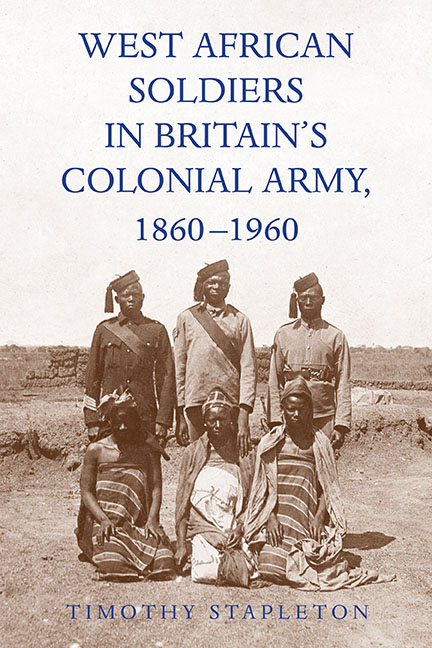Book contents
7 - Women
Published online by Cambridge University Press: 07 October 2022
Summary
A combination of European and African military cultures and histories informed the involvement of women in Britain's West African colonial army. Up to the 1700s, western European armies included large numbers of women mostly categorized under the vague heading of “camp followers.” These women provided various support services including soldiers’ wives and children who foraged for food and firewood, merchants who sold food and liquor, and cooks, laundresses, tailors, and sex workers. From the middle 1700s, the number of “camp followers” in European armies gradually decreased with the development of formal military logistical systems to maintain an increasing number of troops, the rise of Enlightenment ideals of femininity that disapproved of women's presence during wars and the changing status of soldiers from hired mercenaries to citizens serving the nation. During this period, the British Army imposed severe restrictions on marriage among its all-male troops indirectly encouraging what became a stereotypical military “culture of womanizing and misogyny.” This process of reducing the informal involvement of women continued in the Victorian-era British Army given military professionalization and centralization, the wider development of separate social and economic spheres for men and women, and the idealization of Christian marriage and nuclear family life coming out of industrialization. As previously discussed, a series of nineteenth-century Contagious Disease Acts (CD Acts) attempted to protect the sexual health and military effectiveness of Britain's male soldiers and sailors by imposing a regime of medical inspections and detention on female sex workers. By the late nineteenth century, the period of the so-called Scramble for Africa, the British Army and many of its western European counterparts became increasingly male institutions as female “camp followers” almost disappeared, and the small number of women and children associated with the military comprised members of officially regulated nuclear families. Historians know much less about the participation of women in African armies before the twentieth century. While evidence for the role of women in precolonial African warfare remains very limited, the infrequency of standing armies and the absence of logistical services means that the situation in many places likely resembled the “camp follower” culture of early modern European armies. Female fighters like the “Amazons” of Dahomey and celebrated female military leaders such as Queen Nzinga of Angola or Queen Amina of Zazzau (Zaria) in Northern Nigeria were extremely rare in precolonial Africa, with women more typically providing male combatants with food, firewood, intelligence, and motivation.
- Type
- Chapter
- Information
- West African Soldiers in Britain's Colonial Army, 1860-1960 , pp. 237 - 258Publisher: Boydell & BrewerPrint publication year: 2021

